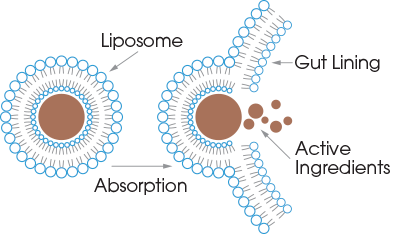Liposomal Micelle Matrix
The liposomal matrix surrounds and protects the active ingredients from stomach acid, helping absorption and promoting the steady release of all ingredients




Brain Greens
Foundation Brain Greens
We selected greens with specific clinically backed properties to support brain health, cognitive function, and overall well-being
Ingredients:
Organic Non-GMO Glycerin, Liposomal Proprietary Blend (Organic Non-GMO Sunflower Oil containing Phosphatidylcholine Sunflower Lecithin), Organic NON GMO Almond Butter, Sulforaphane, Spirulina, Benfotiamine, Organic Non-GMO Vanilla Extract, Lemon Oil, Organic Non-GMO Vitamin E (as D Alpha Tocopherol from Sunflower Oil, an antioxidant to protect flavor), Sodium Copper Chlorophyllin.
Does Not Contain:
GMO, MSG, gluten, wheat, dairy, soy or yeast
Contains:
Tree Nuts (as Almonds)

From cruciferous vegetables like broccoli functions as a powerful antioxidant, with studies suggesting it may be helpful for brain health due to its anti-inflammatory and antioxidant properties.

A blue-green algae considered a “superfood,” may have neuroprotective properties, and its chlorophyll content may help protect against the accumulation of toxins and volatile organic compounds.

A fat-soluble B1 vitamin, is included as clinical studies suggest that insufficient levels can affect neuron energy and acetylcholine production, which may impair cognitive function.

The liposomal matrix surrounds and protects the active ingredients from stomach acid, helping absorption and promoting the steady release of all ingredients

One gel pack replaces all of these pills
Sulforaphane is a phytonutrient, which is a fancy word for “nutrient found in plants.” It functions as a powerful antioxidant, fighting against and repairing damage in every cell in your body. While it is not found in plant form, it is synthesized from a precursor found in cruciferous vegetables, like broccoli.
This precursor is called glucorophanin. When combined with the enzyme myrosinase when the plant is cut, processed or chewed, sulporaphane is crated.
Sulforaphane may have protective effects on cognition and brain function. In a study published in the Journal of Neuroinflammation, sulforaphane was found to reverse cognitive disruption in rats with hyperammonemia. Sulforaphane may also have the potential to prevent neuronal disorders such as Alzheimer’s disease by increasing levels of brain-derived neurotrophic factor (BDNF). BDNF, a key molecule involved in plastic changes related to leering and memory, helps protect existing neurons and supports the growth and differentiation of new ones in the brain. And a 2018 study concluded that sulforaphane can be protective against brain diseases largely due to its antioxidant, anti-inflammatory, and anti-tumor properties.
When administered following traumatic brain injury (TBI), sulforaphane has been demonstrated to attenuate blood-brain barrier permeability and reduce cerebral edema. Finally, sulforaphane, when given to rats following cortical impact injury, improves hippocampal- and prefrontal cortex-dependent cognitive functions. These preclinical findings further support the use of sulforaphane as a potential treatment option following brain injury.
Spirulina is a type of blue-green algae that’s packed with nutrients and often considered a superfood. It grows in both fresh and salt water. It’s been used as a food source for several centuries in Mexico and some African countries, and in the U.S., it’s been sold in supplement form since the 1970s
Spirulina is neuroprotective, contain tryptophan which increases melatonin production, and supports optimal cognition. Known as a neuroprotector, spirulina has been garnering a lot of attention due to its ability to protect anyone from cognition-related diseases. These include schizophrenia, Parkinson’s disease, Alzheimer’s, and major concussions, among others.
Spirulina’s high levels of chlorophyll can help prevent the accumulation of toxins and volatile organic compounds. Spirulina microalgae contain a plethora of nutrient and non-nutrient molecules providing brain health benefits. Numerous in vivo evidence has provided support for the brain health potential of spirulina, highlighting antioxidant, anti-inflammatory, and neuroprotective mechanisms. Preliminary clinical studies have also suggested that spirulina can help to reduce mental fatigue, protect the vascular wall of brain vessels from endothelial damage and regulate internal pressure, thus contributing to the prevention and/or mitigating of cerebrovascular conditions.
Benfotamine is a synthetic form of fat-soluble vitamin B1 with superior bioavailability. Research shows that a single dose of benfotiamine leads to a five-times greater level in the blood than an equivalent dose of thiamine.
Clinical research suggests that thiamine deficiency may lead to an insufficient supply of energy to the neurons of the brain and decreased acetylcholine signalling in the brain, which may impair cognitive function. Furthermore, evidence from trauma and alcohol abuse research demonstrates that adequate thiamine intake is important for individuals who have sustained a brain injury to facilitate recovery and prevent deficiency which would otherwise contribute to the length and severity of secondary cascade processes following TBI.